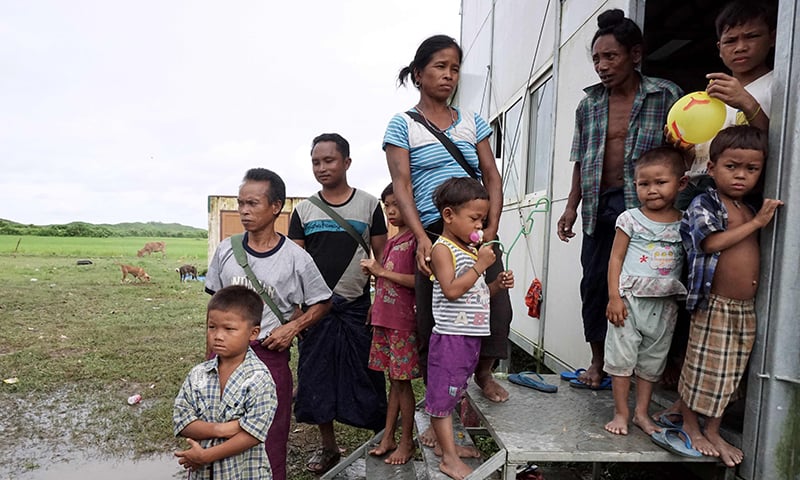More than 27,000 Rohingya Muslims have fled violence in Myanmar in recent days, the United Nations said, as corpses of people drowned in desperate attempts to cross the border river washed up on Bangladeshi soil Friday.
A further 20,000 Rohingya have massed along the Bangladeshi frontier, the UN added in a statement late Thursday, but are barred from entry as they run from burning villages and Myanmar army operations.
Rumours of massacres and the systematic torching of villages by security forces ─ as well as by militants ─ have further amplified tensions, raising fears that communal violence in Rakhine state is spinning out of control.
Rights groups allege a massacre of Rohingya occurred on Sunday afternoon in the village of Chut Pyin in Rathedaung township, led by Myanmar security forces and ethnic Rakhine Buddhist mobs.
Fortify Rights, an NGO with a focus on Myanmar, said eyewitnesses allege mobs shot and hacked down Rohingya villagers ─ including children ─ in a five-hour “killing spree”.
“The civilian government and military need to do everything in their power to immediately prevent more attacks,” Matthew Smith of Fortify Rights said in a statement.
Calls to the President's Office and Myanmar's army went unanswered on Friday and the allegations could not be independently verified by AFP in an area which off-limits to reporters and has become a vortex of claims and counter-claims by the opposing sides.
In a Facebook post earlier this week Myanmar's Information Committee appeared to confirm a major security operation took place around the village on Sunday afternoon as a patrol clashed with scores of Rohingya militants.
“Troops exchanged fire with about 80 extremist Bengali terrorists wielding homemade bombs, guns, knives, and spears,” the statement said, adding the militants then “set their houses on fire and ran away”.
Bodies in the water
Desperate to reach Bangladesh, thousands of Rohingya have taken to makeshift boats, some constructed from flotsam, in an effort to cross the Naf River which separates the two countries.
Eighteen bodies washed ashore on the Bangladeshi side of a river on Friday, a border official said, lifting the grim toll over the last two days from apparent boat capsizes to 41.
“They had been floating in the river for a while,” according to Mainuddin Khan, police chief of the border town of Teknaf, adding the dead included a young girl.
More than 400 Hindus from Rakhine have also crossed into Bangladesh, a community leader there told AFP, after armed men attacked their village, killing and looting.
“They broke into our houses and started slaughtering the men. Then they took away our gold and other expensive belongings and asked us to leave”, Promila Rani, a Hindu woman from Bolibazar village, told AFP.
It is the first time in Rakhine's bitter and bloody five-year crisis that Hindus have fled the country ─ a sign violence is billowing out.
As well as Hindus, thousands of ethnic Rakhine Buddhists and other local ethnic groups have also been displaced ─ the apparent targets of militants who are fighting under the banner of the Arakan Rohingya Salvation Army (ARSA).
The latest flaring of violence began last Friday when Rohingya militants swarmed remote police posts, killing 11 state officials and burning villages.
Myanmar security forces have launched “clearance” operations to sweep out insurgents whose ranks appear to be swelling as male Rohingya villagers join their cause.
An AFP reporter on a government-led trip to Maungdaw this week saw columns of smoke rising from several burning villages, while terrified Buddhist and Hindu civilians huddled in schools in the main town.
International pressure is mounting on Myanmar and its de facto leader Aung San Suu Kyi, who is a Nobel Peace Prize winner.
The United States on Thursday urged Myanmar's military to protect civilians, while Yanghee Lee, the UN's special rapporteur on human rights in Myanmar, expressed fears that “grave violations” could take place.
“The worsening cycle of violence is of grave concern and must be broken urgently,” she added.
Rakhine state has been the crucible of religious violence since 2012, when riots erupted killing scores of Rohingya and forcing tens of thousands of people ─ the majority from the Muslim minority ─ into displacement camps.
The ARSA emerged as a force in October last year when their attacks killed Myanmar border police, prompting a crackdown by security forces that killed scores and forced 87,000 people to flee to Bangladesh.
The Rohingya are reviled in Myanmar, where the roughly one million-strong community are accused of being illegal immigrants from Bangladesh.
Bangladesh already hosts 400,000 Rohingya and does not want more.














































